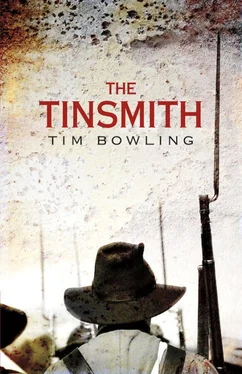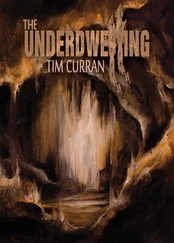The battle in his part of the field raged until early afternoon, then slackened. His regiment was out of it by then; he heard reports that more than half of the men had been killed or wounded, including many officers. While labouring in the barnyard, Anson was aware of the guns continuing to pound in the south, toward the little creek. From time to time, he’d look up from an operation to see a flash of orange light on the horizon. Occasionally, individual cracks of rifles, sounding closer than the thunderlike roll of the artillery, pierced the still fields around him and kept help from those wounded still lying in the zone between the armies, which, as far as Anson could tell, had reached a stalemate. Even in his situation, with the surgery relentless, Anson felt the tension in the air; the imminence of renewed full-fledged fighting was palpable. But here in the north, in the churned fields and broken orchards around his barnyard, the big guns remained silent as the afternoon dragged on and the yellow sun climbed free of smoke threads and burned hotter, increasing the wounded’s desperate thirst as well as Anson’s sense of helplessness; he simply could not do enough to ease the suffering.
As the daylight dwindled and the sun hung bloodily in the smoke of the last fighting, Anson noticed that the palm of his saw hand was blistered. Blood, intestine, and brain splattered his apron. His supply of Latin verbs ran dry.
He stood in a barnyard of flattened grass and operated on a door wrenched off a nearby house and laid out upon four oak barrels. His catling knife, bone saw, and other instruments sat on another barrel just to his right. Twenty feet away, William Childress, another assistant surgeon, bent over a body, his right arm rising and falling in the fading light as he cut through an arm or leg bone—the grating sound, low and dull, remarkably akin to that of wood being sawn, filled the barnyard and made everyone present temporarily unaware of the artillery and musket noises still coming from the south.
Several dozen wounded soldiers lay on the heavily trodden ground, forming a loose line leading up to the operating table. These men were either still in shock or medicated for pain—they posed little problem, though occasionally one resisted the surgery so strongly that hospital stewards were needed to hold him down on the table. It was the others—the slackers, the lightly wounded, members of the Quartermaster corps—whose open-jawed curiosity created a disturbance. Their silent, morbid gawking weighed down Anson’s arm each time he explored a wound, poking a finger deep into torn tissue to remove bits of cloth or dirt or, if he was fortunate, a lead ball or other piece of killing weaponry.
The wound before him was bad, the kneecap shattered and the tissue shredded. Anson chose a spot several inches above the wound and fastened a tourniquet. He picked up his amputating knife from the basin of bloody water and as rapidly as possible cut through the tissue to the bone, then peeled the flap of skin back. Aware of all the eyes of the waiting wounded turned to him, he took up his saw and, placing the blade firmly against the bone, moved his arm back and forth in a steady rhythm.
Around him he heard a sudden commotion as another ambulance wagon arrived, blood dripping through its floorboards. A voice from inside cried, “O Lord O Lord O Lord” without pause. The horse neighed loudly. Someone shouted, “Whoa! Whoa there!” Shadows spread over the ground. The smell of blood and chlorophorm blended with the musk of manure and earth. There came a sharp cry, then a low groan. The dull sawing sound, steady as bee hum, persisted in Anson’s ears, as if divorced from the motion of his arm. He paused to wipe the sweat from his eyes, then wiped his hand on his bloody, gore-covered smock and returned to his task.
Finally, with the useless leg dangling from his hand, he turned toward the ever-lengthening line of wounded. Men of all ages, from hardly-more-than boys to grey- and white-bearded veterans, lay or sat on the ground in loose clusters, their shirts either open or off, their eyes heavy. Several soldiers couldn’t keep their jaws from opening and closing in rapid succession; they resembled baby robins waiting to be fed. Far beyond the clusters of wounded, a burst shell threw up smoke and earth. Anson’s stomach lurched. There’d be little rest this night. But, God knew, there’d been little real rest since he’d enlisted and left behind his somnolent bachelorhood and drowsy practice of mostly sore throats and mild catarrhs and the occasional broken bone, almost always clean, from a fall off a horse or a barn roof. For one thing, there’d been too much to learn, too many vile city diseases to fight, too many new ways to remove flesh and bone and muscle in order to preserve life. And for another thing, there’d been too much death. That was the worst of it. At home, it was easy to believe in the natural course of God’s plan—birth, youth, age, and finally a kind of gradual sunset out of the mortal condition. Even when a baby was stillborn, or a woman died in childbirth, or someone met with a cruel accident, the event was rare enough not to violate the natural laws. But war… it hadn’t just violated, it had destroyed the past fifteen years of Anson’s comfortable abidance in the unquestioned verities of continuance. In any case, how could there be rest during a rebellion, when one side of the body was attacking the other?
He looked down at the lower leg in his hand, as if his thoughts alone had severed it from a body and put it there. And yet he did not doubt the necessity of the fight to keep his country together. No, that was without question. Even so, it was wearying, unpleasant work.
He flung the leg onto a pile of limbs and heard it land with the usual splat, as if he were piling fruit. The sound sickened him anew; it was always a harsh reminder of how infrequently he could keep the wounded whole. Heavily, he turned back to the damaged body on the table and sutured the arteries, his needle pulling the silk thread tight.
“Next!” he called and waited for another wounded man to emerge from the horrified lineup.
Darkness fell at last. The battle sounds ceased, replaced with a steady, echoing lament of suffering. Lanterns bobbed in the fields as hospital stewards and stretcher-men continued to search for wounded. Anson worked with his back to a great gambrel barn, its four sloped roofs giving it a queer, giant bat–like quality whenever he turned and faced its massive bulk. If not for the powerful, comforting scent of alfalfa wafting through its hayloft window, the barn would have seemed a gruesome observer of Anson’s surgeries. Instead, he used the scent of hay, faint though it was, threatening to dissolve completely in the mingled musk of chloroform, blood, and manure in which he stood, to carry him home to his grandparents’ farm. There, at harvest time, many men had worked in the fields, swinging scythes.
This peaceful reverie of reflection never lasted more than a few seconds. Eventually, Anson would look up to see his half-dozen fellow surgeons bent over in the barely sufficient light of sperm-oil candles held in the unsteady hands of exhausted assistants. Sometimes he would be called over by a colleague to consult on a particularly difficult operation, but mostly the surgeons worked independently, with Josiah Rawley, the regimental surgeon, patrolling from candle to candle when he wasn’t busy cutting into flesh and bone himself.
Meanwhile, out in the dark fields, the sharp cracks of pickets’ rifles kept help from reaching those soldiers who had fallen in the contested ground between the armies. But without the constant shrieking and pounding of shells, the worst of the killing was over, and Anson’s body responded. Several times he dashed from the operating table and relieved his bowels in the pasture, where at least the spread manure made his foul contribution less apparent. The cramps intensified as the night wore on, and the energy spent in these evacuations soon brought back his fits of violent coughing.
Читать дальше












